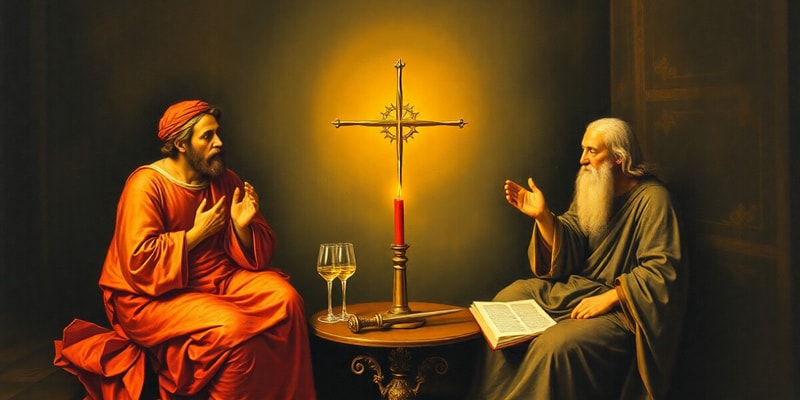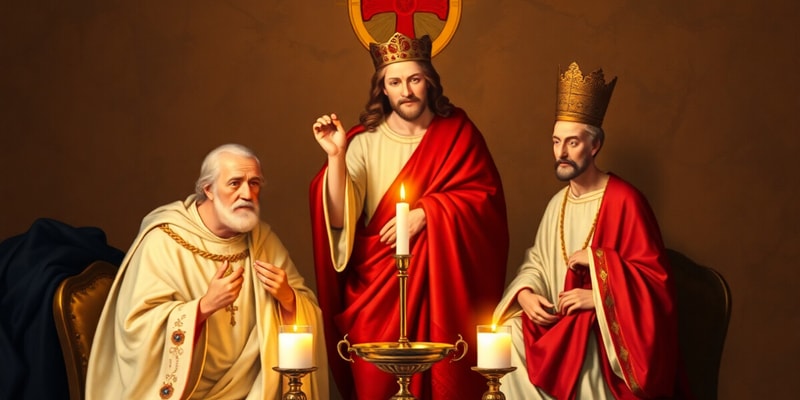Podcast
Questions and Answers
The early Apologists believed that the Logos who became incarnate in Christ was the supreme God.
The early Apologists believed that the Logos who became incarnate in Christ was the supreme God.
Answer hidden
Clement of Alexandria is cited as an example of Eastern Fathers of the Church who saw the Son as a subordinate mediator.
Clement of Alexandria is cited as an example of Eastern Fathers of the Church who saw the Son as a subordinate mediator.
Answer hidden
Origen is considered the most significant theologian of the fourth century.
Origen is considered the most significant theologian of the fourth century.
Answer hidden
According to Origen, the Father serves as the cause and originator of all, while the Spirit plays a role in the fashioning of the rational world.
According to Origen, the Father serves as the cause and originator of all, while the Spirit plays a role in the fashioning of the rational world.
Answer hidden
Much of the Trinitarian debate after Origen was influenced by his complex and ambiguous thoughts.
Much of the Trinitarian debate after Origen was influenced by his complex and ambiguous thoughts.
Answer hidden
Pliny the Younger claimed that Christians were chanting hymns to Jesus as a God, demonstrating their devotion to polytheism.
Pliny the Younger claimed that Christians were chanting hymns to Jesus as a God, demonstrating their devotion to polytheism.
Answer hidden
Sabellian Modalism suggests that there is one God who takes on different roles in a similar manner to an actor changing masks.
Sabellian Modalism suggests that there is one God who takes on different roles in a similar manner to an actor changing masks.
Answer hidden
The concept of deifying Roman emperors aligns directly with the monotheistic beliefs held by early Christians.
The concept of deifying Roman emperors aligns directly with the monotheistic beliefs held by early Christians.
Answer hidden
Von Harnack was among the first to advocate for the concept of modalism in Christian doctrine.
Von Harnack was among the first to advocate for the concept of modalism in Christian doctrine.
Answer hidden
Athanasius believed that the Son could not be divine without the Father being present.
Athanasius believed that the Son could not be divine without the Father being present.
Answer hidden
The council of Nicaea definitively resolved the conflict between orthodoxy and Arianism.
The council of Nicaea definitively resolved the conflict between orthodoxy and Arianism.
Answer hidden
Early Christians openly participated in the worship of many deities within the Roman religious environment while maintaining their devotion to Jesus.
Early Christians openly participated in the worship of many deities within the Roman religious environment while maintaining their devotion to Jesus.
Answer hidden
According to Athanasius, salvation involves sharing in the life of the Trinity.
According to Athanasius, salvation involves sharing in the life of the Trinity.
Answer hidden
Athanasius used logic similar to Origen's when arguing for the divine status of the Holy Spirit.
Athanasius used logic similar to Origen's when arguing for the divine status of the Holy Spirit.
Answer hidden
The term 'homoousios' signifies a relationship of equality between the Father and the Son.
The term 'homoousios' signifies a relationship of equality between the Father and the Son.
Answer hidden
Origen claimed that the Son was eternally and timelessly created.
Origen claimed that the Son was eternally and timelessly created.
Answer hidden
According to Origen, it is logical to speak of a father without referencing a son.
According to Origen, it is logical to speak of a father without referencing a son.
Answer hidden
Origen indicates that the Father is greater than the Son and Holy Spirit.
Origen indicates that the Father is greater than the Son and Holy Spirit.
Answer hidden
Origen's theology does not reflect any signs of subordinationism.
Origen's theology does not reflect any signs of subordinationism.
Answer hidden
The concept of a hierarchical Trinity was uncommon before the council of Nicaea.
The concept of a hierarchical Trinity was uncommon before the council of Nicaea.
Answer hidden
Study Notes
Introduction to the Trinity
- The doctrine of the Trinity is a solution to a problem faced by early Christians
- The problem was grappling with Christianity's origins in Judaism (monotheism) and the worship of Jesus as God
- Evidence of the strict monotheism inherited from Judaism is found in Jewish prayers
- An example is the verse 4 of Deuteronomy Chapter 6 ("Hear O Israel, the Lord is our God...You shall love the Lord your God with all your heart with all your soul with all your mind") and the Ten Commandments "I am the Lord your God who brought you out of the land of Egypt, out of the house of slavery. You shall have no other Gods beside me." (Exodus 20:2-3)
Monotheism and Christianity
- Christianity inherited monotheism from Judaism
- The Apostle Paul, in condemning idolatry, stated, "We know that an idol is nothing at all in the world and that there is but one God, the Father from whom all things come and from whom we live" (1 Corinthians 8:4)
- Christian devotion to Jesus coexisted with a continuing monotheistic stance
Monotheistic Faith and the Worship of Jesus
- Christian devotees offered religious devotion to Jesus as God
- This apparent contradiction was addressed via different theological approaches
Sabellian Modalism
- A solution that explores the notion that one God takes on different roles over time (like an actor in a play)
- The biblical drama of creation, redemption and new creation are the roles
- God plays the role of creator first, then redeemer in the person of Jesus, etc.
Logos Theology
- Another approach suggesting that Jesus is not just God taking on a new role
- Jesus' pre-existence with God from the beginning of creation is the idea.
The Apologists
- Emphasized the theology of the Logos, reflecting the influence of Greek philosophy
- Justin Martyr (100 – 165 CE), a significant figure in this, viewed Christ as an incarnation of a rational principle
- He moved from Platonic philosophy to Christianity
Subordinationism
- The Son is seen as subordinate to the Father in terms of status or power
- A means of maintaining monotheism while acknowledging Jesus' divinity
- Some important thinkers who were proponents of this were Origen, Clement of Alexandria and Tertullian
Arius
- A priest in Alexandria who challenged the traditional view of the Trinity
- Arius argued that the Son was not co-eternal with the Father and had a subordinate role to Him
- The origins of the debate were due to existing tensions in the Church
The Council of Nicaea
- A council convened by Constantine I to address the Arian controversy
- A common, baptismal confession of faith was used, with clarifying additions to refute Arius
- The resulting creed defined the Son as "begotten, not made, consubstantial with the Father" (homoousios)
Athanasius
- A major figure opposing Arius
- He emphasized Jesus' full divinity and co-equality with the Father
- He focused on the unity in action, inseparable operations and the importance of true divinity to the Christian faith
The Cappadocian Fathers
- A group of theologians who further clarified Trinitarian theology
- They emphasized the inseparable operations and the distinction of individual Persons within the Godhead
- They were important for maintaining the orthodoxy of the Nicene formulations
Studying That Suits You
Use AI to generate personalized quizzes and flashcards to suit your learning preferences.
Related Documents
Description
Explore the concept of the Trinity in Christianity and its roots in Jewish monotheism. This quiz delves into how early Christians reconciled their faith with the monotheistic beliefs of Judaism, supported by scriptural evidence. Test your understanding of these foundational theological principles.





